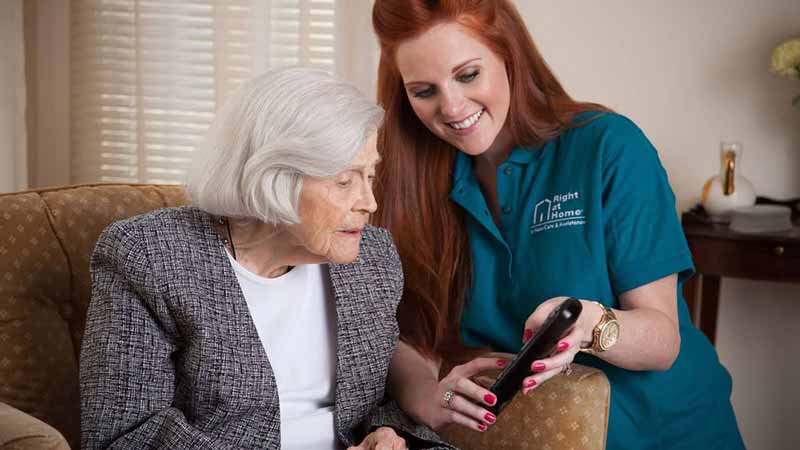

The Risks of Not Hiring In-Home Care Through an Agency
In years gone by, younger family members traditionally supported the well-being of their elders—but current demographics make that less possible. We are living longer. In fact, according to the U.S. Census Bureau, older adults are the fastest-growing age group today. Our lower birth rate means there are fewer adult children available to help—and many baby boomers never had children. Family members often live at a distance, making day-to-day support difficult.
Sometimes moving to a supported living environment, such as an assisted living facility, is the best choice. But today, more and more older adults prefer to stay in their own homes , even as their care needs change. To supplement the care provided by families, in-home care is more popular than ever. If your family decides to go that route, what steps should you take to find a caregiver and ensure that they are reliable and capable?
Some people choose to hire privately, locating caregiver candidates from their neighborhood blog, an ad on the church bulletin board, or a job search website. Some of these caregivers are hired as household employees, some are independent contractors, and some are informal and unreported.
This is called “gray market” hiring. According to a June 2021 study from the RAND Corporation, nearly one-third of families hire caregivers through this “gray market,” which RAND defines as “providers who are unrelated to the recipient, not working for a regulated agency, and potentially unscreened and untrained.”
The study authors, headed by Regina A. Shih, a senior policy researcher at the RAND Corporation, note that gray market caregivers do not have to follow the standards that agencies do, such as undergoing a criminal background check, providing proof of their education or training, and maintaining records.
“Without agency oversight, the quality of care provided by gray market caregivers is unknown, and the potential for exploitation or abuse—of both the care recipient or the care provider—has not been systematically studied,” noted Shih, who urges further research on the topic.
On the other hand, the study authors note, “When workers are employed by an agency, they are generally covered by disability and liability insurance to protect consumers and providers in the event of on-the-job accidents. Agency-based employees also may be eligible for or contribute to social insurance and employee benefit programs.”
If you are considering hiring privately, first consider the supervisory, human resources and legal roles you will have to fill:
Evaluating your loved one’s care needs. You will have to start from scratch understanding your loved one’s health, social and supervision needs, and creating a plan for meeting those needs.
Interviewing and hiring a caregiver. In gray market hiring, it’s up to your family to check the qualifications of potential caregivers, and to perform a background check to protect your loved one from incompetent care, elder abuse and financial exploitation.
Training. You would be responsible for determining whether the care provider knows how to safely care for your loved one. For example, if your family member needs to be transferred from a wheelchair, you would need to be sure that the care provider knows how to do this safely.
Withholding and reporting income taxes and paying Social Security taxes. This can be very complicated if you’ve never been an employer. You could find yourself facing fines and even criminal penalties if you are caught paying “under the table.”
Dealing with work-related injuries. If the caregiver were to be injured on the job, you could end up paying the medical bills. The caregiver could file a workman’s compensation claim or even file a lawsuit against you or your family. And home insurance policies usually exclude coverage for employees in the home.
Locating backup care. Even the most conscientious caregiver will miss a shift from time to time, due to illness or a personal emergency. Caregivers need time off for personal needs. And what if your caregiver quits on short notice? Families may find themselves scrambling to find coverage for their loved one’s care on such occasions.
Discipline and termination. If the caregiver you hire on the gray market misses shifts, often arrives late, or doesn’t seem to be providing optimum care for your loved one, you are on your own to deal with discipline or termination—uncomfortable tasks for most people. You might also need to deal with unemployment claims.
Hiring through a reputable agency takes most of the employer responsibility off your plate. The agency recruits, screens, hires, trains and supervises their workers. The caregivers who come to your home are employees of the agency and are bonded and insured. You pay the agency, and the agency handles all payroll taxes and other human resources tasks. They can send a backup caregiver, if needed.
The agency will select a compatible caregiver who matches your family’s needs. If there’s a problem, the agency will handle it. And if for whatever reason you or your loved one feel that the caregiver just isn’t working out, there’s no drama. The agency can handle the switch, sending a new caregiver who is a better fit.
Right at Home will work with your family to select compatible, qualified professional caregivers to ensure your loved one’s well-being at home, as well as peace of mind for the whole family. Our unique five-step process ensures just the right fit for your family. Contact your local Right at Home today and ask for a FREE in-home consultation.







